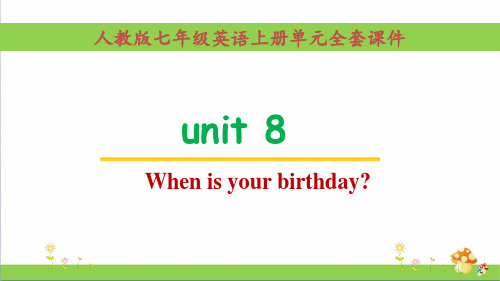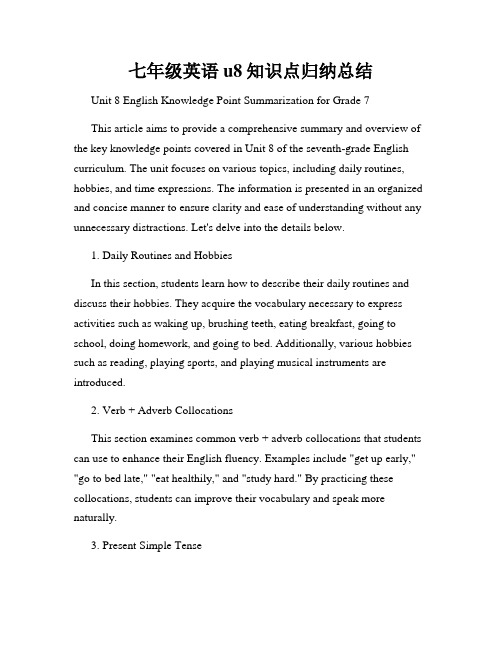人教版 七年级上册 英语知识点 全 第八单元 unit 8 知识点
秋七年级英语人教版上册练习课件:Unit 8 单元知识归纳(共11张PPT)

•
•9、要学生做的事,教职员躬亲共做;要学生学的知识,教职员躬亲共学;要学生守的规则,教职员躬亲共守。2021/9/142021/9/14Tuesday, September 14, 2021 •10、阅读一切好书如同和过去最杰出的人谈话。2021/9/142021/9/142021/9/149/14/2021 11:31:26 AM •11、只有让学生利地学习……(这)是教育过程的逻辑。2021/9/142021/9/142021/9/14Sep-2114-Sep-21 •12、要记住,你不仅是教课的教师,也是学生的教育者,生活的导师和道德的引路人。2021/9/142021/9/142021/9/14Tuesday, September 14, 2021
13、He who seize the right moment, is the right man.谁把握机遇,谁就心想事成。2021/9/142021/9/142021/9/142021/9/149/14/2021 •14、谁要是自己还没有发展培养和教育好,他就不能发展培养和教育别人。2021年9月14日星期二2021/9/142021/9/142021/9/14 •15、一年之计,莫如树谷;十年之计,莫如树木;终身之计,莫如树人。2021年9月2021/9/142021/9/142021/9/149/14/2021 •16、教学的目的是培养学生自己学习,自己研究,用自己的头脑来想,用自己的眼睛看,用自己的手来做这种精神。2021/9/142021/9/14September 14, 2021 •17、儿童是中心,教育的措施便围绕他们而组织起来。2021/9/142021/9/142021/9/142021/9/14
(人教版)七年级英语上册unit8单元全套课件

2. Tree Planting Day (植树节) is in _M__a_rc_h__.
3. Mother’s Day is in __M_a_y__.
小贴士:
4. Christmas Day is in _D_e_c_em__b_e_r__. 月份前加介
5. Teachers’ Day is in _S_e_p_te_m_b_e_r_. 词in.
It is on September 6th.
I'm little reporter.
Move from your seat and interview five students the date of their birthday. Then do a report for your classmates.
➢ Warming-up
Do you know the months of a year?
spring
summer
autumn
winter
1a Listen and repeat.
MONTHS
Ja一nu月ary Feb二ru月ary M三ar月ch A四pr月il M五a月y J六un月e Repeat the 12 months with you partner J七uly月 Au八gu月st Sep九te月mber O十ct月ober N十ov一em月ber D十ec二em月ber
1c Practice the conversation above with your
partner. Then make your own conversations.
When is your birthday? My birthday is on October 10th.
人教版英语七年级上册所有单元知识点总结

七年級各單元知識點匯總Unit1 My name’s Gina.重點短語1.your/his/her/my name 你の/他の/她の/我の名詞2.first name 名字3.middle school 中學4.telephone number 電話號碼st name 姓6.in China 在中國重點句型1.—What’s your name? 你叫什麼名字?—Alan 艾倫2.—I’m Jenny. Nice to meet you. 我是珍妮。
見到你很高興。
—Nice to meet you, too.見到你我也很高興。
3.—Good morning! I’m Cindy. 早上好!我是辛迪。
—Hello, Cindy! I’m Dale.你好,辛迪!我是戴爾。
4.—My name’s Linda. Are you Helen? 我是琳達。
你是海倫嗎?5.—What’s her name? 她叫什麼名字?—She’s Jane. 她是簡。
6.—Is he Jack? 他是傑克嗎?—No, he isn’t. His name’s Mike.不,他不是。
他の名字是邁克。
7.What’s your phone number?你の電話號碼是多少?It’s 587-6275. 它是587-6275。
8.My friend is in China.我の朋友在中國。
重點語法1.2.Be動詞の一般現在時形式:am, is, areI用am You 用areIs 用於他他它Unit2 This is my sister.重點短語1.family name 全家福2.have a good day (表示祝願)過得愉快!3. a picture of 一張……の照片4.in the first phone 在第一張照片裏5.family tree 家庭關係圖6.the name of…………の名字重點句型1.That’s my family. Those are my parents. 那是我の家人,那是我の妹妹。
人教七年级上册Unit 8重点讲解

人教七年级上册Unit 8重点讲解1.when & what time【观察】请同学们仔细观察下列对话,思考when和what time用法的区别。
①—When do we have English?—At 10:00.②—What time do you usually have lunch?—At twelve.③—When is School Day?—On March 30th.④—What time is it?—It's 9:30.【点拨】★询问做某事的具体时间(钟点)时,两者可以互换,如对话①和对话②;★询问事件发生的年份、月份、日期等非钟点时间时,只能用when,如对话③;★询问钟表所显示的时间时,只能用what time,如对话④。
【拓展】★time作名词,在本单元中意为“时间”,通常为不可数名词,常用于It's time to do sth.句型中,意为“做某事的时间到了”。
★time还可意为“次;回”,为可数名词,如four times (四次)。
【练一练】Ⅰ.用when或what time填空1. —_______ is our art festival?—In July.2. —_______ is it now?—It's 2:00.3. —_______ does your sister go to school in the morning?—At abouteight.Ⅱ.写出划线部分的汉语意思1. Come on, Mary! It's time to eat dinner! _____2. Eric does sports three times a week. _____2. 名词所有格我们在Unit 4中已经学习了名词所有格的部分用法,本单元我们将继续学习名词所有格的其他用法。
【观察】请同学们仔细观察下列句子中的划线部分,思考它们的含义及构成。
七年级上册英语unit8

七年级上册英语unit8
以下是七年级上册英语Unit 8的常见知识点总结:
1. 词汇和短语:掌握并能够正确运用本单元的词汇和短语,如“healthy”、“unhealthy”、“food”、“exercise”等。
2. 语法:了解并掌握一些基本的英语语法,例如比较级(healthier、more delicious)、最高级(healthiest、most delicious)以及情态动词(can、should、must等)的用法。
3. 听力和口语:通过听力练习和口语活动,提高听力和口语表达能力。
能够听懂关于健康生活方式的对话和短文,并能够用英语表达自己的健康生活方式。
4. 阅读和写作:通过阅读和写作练习,提高阅读和写作能力。
能够读懂关于健康生活方式的文章,并能够写出自己的健康生活方式计划。
5. 文化知识:了解不同国家的健康生活方式和文化,以及它们对健康的影响。
例如,美国的快餐文化、日本的健康饮食文化、中国的传统健身文化等。
希望以上信息对您有帮助。
如果您需要关于这一单元更详细的信息,建议参考教辅或课本目录。
Unit8SectionB1a-1d讲义人教版英语七年级上册

Unit 8 Section B 1a to 1d 教学重点:序数词;名词所有格课前预习教学目标:序数词;名词所有格教学难点:序数词;名词所有格课前预习语法:序数词;名词所有格课前预习英汉互译1.English 。
2.game .3.事件 .4 basketball 。
5.how about you? 。
6.聚会 .7.calender 。
8.trip .小组合作1.重点单词test测验;检查trip旅游;旅行art艺术;美术festival (音乐、戏剧等的)会演节;节日dear亲爱的student学生thing东西;事情term学期busy忙碌的;无暇的time时间there (在)那里2.重点短语English test英语测试English Day英语节school trip学校郊游art festival艺术节basketball game篮球比赛Sports Day体育节;运动会School Day学校开放日this term这个学期book sale售书have a good time过得愉快3.重点句型We have some interesting and fun things for you this term.本学期我们为你们安排了一些有趣又好玩的事情。
Next month, we have an art festival.下个月,我们举办一次艺术节。
Have a good time!(祝你们)过得愉快!See you there!在那儿见!4.school trip学校郊游要点精析trip为可数名词,意为“旅游;旅行”,尤指短途游玩或有目的的旅行。
表示“去旅行”可用go on a trip或take a trip。
例: They decide to take a trip to Qingdao.他们决定去青岛旅行。
知识拓展a school/ bus trip学校/汽车旅行a family trip家庭旅行a trip ......的旅行5. basketball game篮球比赛。
人教版七年级英语上册第八单元课件

ninth
eleven tenth
twelve eleventh
twelfth
1st thirteen
thirteenth
2nd fourteen
fourteenth
3rd fifteen
fifteenth
4th sixteen
sixteenth
5th seventeen seventeenth
6th eighteen
November
22
写作:November 22nd 读作:November twenty-secondWrte down the dates
8月
2
August 2nd
August second
6月
12
June 12th
June twelfth
9月
20
September 20th
September twentieth
3 B: My birthday is June fourth.
Pairwork
• A: When is your birthday? • B: My birthday is ___. When is your birthday? • A: My birthday is ___.
Self reflection
February ['februəri]
March [mɑ:tʃ]
April ['eiprəl]
May [mei]
June [dʒu:n]
July [dʒu(:)'lai]
August ['ɔ:gəst]
September
[sep'tembə]
七年级英语u8知识点归纳总结

七年级英语u8知识点归纳总结Unit 8 English Knowledge Point Summarization for Grade 7This article aims to provide a comprehensive summary and overview of the key knowledge points covered in Unit 8 of the seventh-grade English curriculum. The unit focuses on various topics, including daily routines, hobbies, and time expressions. The information is presented in an organized and concise manner to ensure clarity and ease of understanding without any unnecessary distractions. Let's delve into the details below.1. Daily Routines and HobbiesIn this section, students learn how to describe their daily routines and discuss their hobbies. They acquire the vocabulary necessary to express activities such as waking up, brushing teeth, eating breakfast, going to school, doing homework, and going to bed. Additionally, various hobbies such as reading, playing sports, and playing musical instruments are introduced.2. Verb + Adverb CollocationsThis section examines common verb + adverb collocations that students can use to enhance their English fluency. Examples include "get up early," "go to bed late," "eat healthily," and "study hard." By practicing these collocations, students can improve their vocabulary and speak more naturally.3. Present Simple TenseThe present simple tense is a fundamental aspect of English grammar covered in this unit. Students learn how to construct sentences using the present simple tense, both in affirmative and negative forms. They also become familiar with the use of third-person singular pronouns, such as he, she, and it.4. Adverbs of FrequencyAdverbs of frequency provide valuable information about the regularity or frequency of actions. Students learn various adverbs, such as always, often, sometimes, rarely, and never, and understand where to place them within sentences. This knowledge enables them to accurately express how often they engage in different activities.5. Time ExpressionsThis section focuses on time expressions, which allow students to provide specific details about when activities occur. They acquire vocabulary related to weekdays, weekends, months, and seasons. Common time expressions, including "on Monday," "in the morning," and "in July," are introduced and practiced.6. Question WordsQuestion words are essential for gathering information and initiating conversations. Students learn the most commonly used question words, such as who, what, when, where, why, and how. By mastering these question words, students can formulate questions and engage in meaningful dialogues with their peers.7. Listening and Speaking SkillsThroughout Unit 8, students engage in various listening and speaking activities to reinforce their understanding of the covered topics. They listen to audio clips, dialogues, and speeches related to daily routines, hobbies, and time expressions. Through regular practice, they improve their listening comprehension and speaking fluency.8. Reading and Writing SkillsReading passages offer opportunities for students to apply their knowledge and practice reading comprehension skills. They encounter texts that discuss different routines and hobbies, allowing them to reinforce their vocabulary and grammatical understanding. Additionally, writing exercises prompt students to compose sentences and short paragraphs related to the unit's content.In conclusion, Unit 8 of the seventh-grade English curriculum covers a range of essential knowledge points related to daily routines, hobbies, time expressions, and basic grammar structures. By mastering these points, students can effectively communicate in English, expressing their routines, discussing their hobbies, and accurately conveying time-related information. As students progress through the unit, frequent practice and reinforcement of the learned knowledge points contribute to their overall language development and proficiency.。
- 1、下载文档前请自行甄别文档内容的完整性,平台不提供额外的编辑、内容补充、找答案等附加服务。
- 2、"仅部分预览"的文档,不可在线预览部分如存在完整性等问题,可反馈申请退款(可完整预览的文档不适用该条件!)。
- 3、如文档侵犯您的权益,请联系客服反馈,我们会尽快为您处理(人工客服工作时间:9:00-18:30)。
Unit 8 询问日期及月份的表达。 教学重、难点 1.掌握12个月份的表达法,并会询问日期;2.序数词的书写。
1、重点词汇:when, month, January, March, April, May, June, July, August, September, October, November, December happy, old, party, first, second, third, fifth, eighth, ninth, twelfth, twentieth ,test, trip, festival, busy, time, there 1、 重点短语: 1.happy birthday 生日快乐 2.how old……多答年级 3.in August 在八月 4.see you 再见 5.English test 英语测试 6.school trip 学校郊游 7.basketball game 篮球比赛 8.art festival 艺术节 9.have a good time玩得愉快 10.have an English party举办一次英语聚会 3、十二月份的书写: January一月 February 二月 March 三月 April 四月 May 五月 June 六月 July 七月 August 八月 September 九月 October 十月 November十一月 December 十二月 表示月份的名词缩写形式:Jan., Feb., Mar., Apr., May., Jun., Jul., Aug., Sep., Oct., Nov. ,Dec.。 1) 月份前常用介词in e.g. in February/ September/November e.g. We go there in January. 2)表示每个月份的英语单词第一个字母要大写。 4、When is your birthday, Linda 1)when 疑问副词,“什么时候”,引导特殊疑问句,常用来对年、月、日以及时刻进行提问,也可询问某一动作发生的时间,其结构为“when + 一般疑问句”? When do you go to school / When are you at home 】而 what time 强调“几点”,对更具体的时间提问。 e.g. What time is it / What’s the time? 2)birthday n.“生日”, a birthday party 生日聚会 a birthday present 生日礼物 a birthday cake 生日蛋糕 birthday candles 生日蜡烛 5、My birthday is on May 2nd. 英语日期前介词的使用:若指在哪一年或哪一月,则用介词in,若具体到某一天,则需用介词on。 e.g. I often visit my aunt on May 1st. 】英语中日期的表达方法: 1) 美式英语表达法:按月、日、年的顺序。“日”与“年”之间要加“,”。书写时,“日”可以写成序数词的形式,也可以写成阿拉伯数字;读时,“日”一定要读作序数词,并加定冠词the。 February 1/1st,1998 读作February the first, nineteen ninety-eight. 2) 2)英式英语表达法:按日、月、年的顺序。“月”与“年”之间要加“,”。书写时,“日” 可以写成序数词的形式,也可以写成阿拉伯数字;读时,“日”一定要读作序数词,而且前面要加介词of。 1/1st, February,1998读作the first of February, nineteen ninety-eight. ——When and where were you born ——I was born _____ October 1st,1998_____Suzhou. A. on; on B. in; in C. on; in D. in; on 】介词on 用来表示具体的一天或一天的上午、下午或晚上。e.g. on May 2nd./ on Tuesday morning 介词at常用在具体的时间点前 e.g. at 6:30 介词in 常用于年、月、日、季节、世纪等大时间前,还可用于上午、下午或晚上等时间n.前 e.g. in the morning / evening / in 1989 / in May/ in spring/autumn 6.date n.“日期” e.g. What’s the date today 今天是几月几日? 】辨析:date 与 day
date 意为“日期”,常指“几月几日”。一般先说月份,再说日期,最后说年份 ——What’s the date today今天是星期几? ——It’s November 15th,2011.
day 意为“天”,指24小时,一整天 What day is it today?今天星期几
指“特定的重大的日子、节日” It’s Children’s Day.今天是儿童节。 Tomorrow is May Day.明天是五一节。
意为“白昼”,与night相对 day and night 白天和夜晚 7.When is Alice’s birthday Alice’s 为名词所有格形式,意为“艾莉斯的”。名词所有格表示人或物的所有及所属关系,在句中常作定语。名词所有格的构成有’s所有格、of所有格和双重所有格三种形式。 (1)’s所有格:1)一般情况下,在单数名词的词尾加’s; Jim’s book 吉姆的书 2)以-s或-es结尾的复数名词在词尾加“’” the students’ basketball学生们的篮球 3)不以-s结尾的复数名词在词尾加’s Children’s Day / men’s clothes男士服装 4)表示两者或两者以上的人共同拥有某人或某物时,其名词所有格形式为:名词+and +名词’s e.g. Tom and Jim’s teacher 汤姆和吉姆的老师 5)表示两人各自拥有不同的人或物时,其名词所有格形式为:名词’s + and +名词’s e.g. Lucy’s and Lily’s brothers 露西的哥哥和莉莉的哥哥 (2)of所有格:名词 + of + 名词 a picture of my family (3)双重所有格:’s所有格 与of所有格 相结合 a friend of my father’s 我父亲的一个朋友 】名词所有格的用法: 1) 表示有生命的人或高级动物的所属关系; This is our teacher’s room. 2) 表示国家、城市、时间等名词的所属关系;All the students are going to our city’s museum. 3) 表示无生命的物体的名词所有格一般用of短语; the door of the room房门 4) 所有格后带有地点名词时,可将该地点省略。Let’s go to uncle’s to have supper. Many people have got the habit of buying flowers for their mothers on_______. A. Mothers’ Day B. the Mothers’s Day C. the Mother’s Day D. Mother’s Day 8.happy adj. 辛福的,快乐的,——否定形式 unhappy adj.不高兴的,不幸福的 形容词happy常用于假日之前,表示祝福; e.g. Happy New Year! / Happy Children’s Day!儿童节快乐 其答语:Thank you!/Thanks a lot!/Thank you very much!/The same to you! 9.how old “多大年龄,几岁”,对年龄进行提问,其结构为:How old be + 主语?其答语常用句型:“主语 + be + 基数词+ year(s)/month(s) old./直接用数字表达。 ——How old is she?/What’s Bob’s age ——She is ten years old. / She is 10. 当old adj.意为“老的,年长的”,——反义词 young 幼小的;当意为old“旧的”,——反义词new 新的。 10.do you want to come to my birthday party ======Would you like to come to … 11.——When is it ====What time is it ——At three this afternoon. 12.at your school 在你们的学校 介词at常用在范围较小的地点,(确切地点),而表示较大范围的地点用in e.g. They arrived in Shanghai 13.school trip 学校郊游 trip n.旅游,旅行,尤指短途游玩或有目的的旅行。 e.g. They are on a trip to Beijing.他们在去北京的旅行中。 a weekend trip 周末旅行 a bus trip 汽车旅行 go for a trip 去旅行 14、game n.“比赛”,常表示棋类、桥牌等项目的比赛。表示摔跤、拳击在等项目比赛时,多用match. e.g. have a volleyball game 举行一次排球赛 】games 还可作“运动会”讲,特别是大型运动会,如:Olympic Games 奥运会;Asian Games 亚运会 games 还可以作“游戏”讲。 e.g. We often play games in English class. 15.can 情态动词,“会,能”,表示说话人的情感,态度和能力,不能单独作谓语,只能和实意动词一起构成,且没有人称和数的变化,即 can + 动词原形 e.g. I can bring some books to school. / He can take me to Beijing. 含有情态动词的句子,在变成一般疑问句时,要把情态动词提前;变否定句时,在情态动词前加not。 e.g. Can you see the ball under the chair / I can’t see the ball. 16.have v. 举办,开展,召开,有人称和数的变化(has),变疑问句和否定句时需借助助动词do/does。 e.g. We’ll have a music festival next week.下周我们将举办一次音乐会。 Does she have a music festival at your school 17、busy adj.忙的,繁忙的 1)be busy doing sth.忙于做某事 2)be busy with sth.忙于某事 e.g. I’m very busy today.今天我很忙。 She is busy doing her homework.===She is busy with her homework.她正忙着做家庭作业。 18、Have a good time! 祝你们玩得开心!
